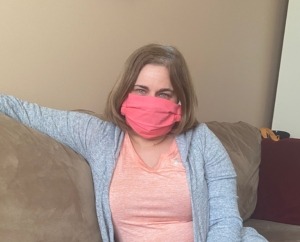 My first professional writing gig was as a weekend obit writer for the Daily Local News in West Chester, PA. As far as the newspaper hierarchy goes, this job is the bottom of the totem pole. And because of that, you may think the obituaries are not as important as the big story. But, I still felt my work was essential because I knew many readers often turn to that section first to see if they knew anyone listed there. If I close my eyes, I can picture my eager-to-please, 20-something self sitting in the back of that old newsroom by the phone and fax machine waiting for death notices to come through.
My first professional writing gig was as a weekend obit writer for the Daily Local News in West Chester, PA. As far as the newspaper hierarchy goes, this job is the bottom of the totem pole. And because of that, you may think the obituaries are not as important as the big story. But, I still felt my work was essential because I knew many readers often turn to that section first to see if they knew anyone listed there. If I close my eyes, I can picture my eager-to-please, 20-something self sitting in the back of that old newsroom by the phone and fax machine waiting for death notices to come through.
Sounds morbid, right? That’s because it was. One car accident or house fire could make for a busy and exhausting day. The good days were when no one died, or when I wrote about a 90-year old nursing home resident who went peacefully in her sleep.
I learned a few things about people skills and professionalism during my short tenure. I was rather chummy with the local funeral directors who made my job a lot easier by confirming the spelling of the name of the deceased, the memorial service information or getting the approval of the obit from the family.
And then, there were times when I had to call the family myself.
“Hi, this is Elisa from the Daily Local. I’m so sorry for your loss. I know this is a difficult time for you and your family, but I have an 8 pm deadline and I need your approval to run the obituary. Also, do you have a photo to go with it? If so, here is how you can send that over to me, and I’d be happy to include it with the article.”
What a weird job.
During this pandemic, I think about the person now sitting at my old desk. Sadly, he or she must be quite busy these days and maybe they leave the office exhausted. People of all ages and stages of life are dying every day – not by accident or fire – but by plague. I wonder if the paper brought in some additional writing help. Although to be honest, the writing is not that hard. One would think capturing the life of another person would take time and a considerable amount of effort. Admittedly, I don’t know how obits are written today, but back then it was an incredibly structured boilerplate of 150 words or less. The only exception was when an elected official or local celebrity passed away which often justified a higher word count.
In most cases, the obituary went something like this.
Mr. Jones, a beloved local high school teacher, died at age 90 of cancer. Born in West Chester, he lived in Phoenixville his entire life. He taught 10th-grade algebra for 25 years before retiring in 1991. He was a Vietnam War vet, a Boy Scout leader for Pack 573 and a church elder at West Chester Presbyterian. He loved to go fishing, play golf and spend quality time with his four grandchildren. Mr. Jones leaves behind his wife of 45 years, Emily, their son Frank and daughter Cheryl, his brother Mike Jones of Exton, and four grandchildren. Funeral services will be held on April 10th at 9 am (enter name of funeral home and address). Interment will be held at (enter name of the cemetery). A reception will take place at (restaurant name). In lieu of flowers, please make a donation to the American Cancer Society.
It always struck me how their lives could never be fully captured in a few words. But recently, The New York Times found a way to honor those who died of COVID-19 on their front page. Writers and editors took the time to go through the obituaries of 1,000 New Yorkers and carefully chose the perfect words to describe who they were in life.
Hailey Herrera, 25, Budding therapist with a gift for empathy
Michael Angel Bastiaans, 31, Indonesian teacher who reached into his own pocket to help students
Ty, 47, British rapper with a storytelling gift
Vanee Sykes, 53, Advocate for women released from prison
Orlando Moncada, 56, Left Peru and grabbed on to the American dream
Madeline Kripke, 76, Collector of dictionaries and lover of words
Romi Cohn, 91, Saved 56 Jewish families from the Gestapo
This act of kindness by the writers of the Times reminds me that words are powerful–even in 10 words or less. It may have been the best way to honor those lives well lived.
May their memories be for a blessing. And God bless the obit writers who – to me – are also essential workers.

 The very definition of being in control is having the power to influence or direct people’s behavior or the course of events.
The very definition of being in control is having the power to influence or direct people’s behavior or the course of events. Well, it’s happening. We are slowly starting to enter into a whole new world. A world where we need to wear face masks in public. A world where we still need to maintain a social distance from each other. A world where we need to remember to bring your keys, phone, wallet, face mask, gloves and hand sanitizer before we leave the house. And when we leave the cocoon of our homes, we must learn to trust other people that they have socially distanced as well. Let’s face it – few of us have followed these things to the letter. Personally, I would have loved to secure a delivery slot on Peapod or Instacart instead of going to the grocery store every week.
Well, it’s happening. We are slowly starting to enter into a whole new world. A world where we need to wear face masks in public. A world where we still need to maintain a social distance from each other. A world where we need to remember to bring your keys, phone, wallet, face mask, gloves and hand sanitizer before we leave the house. And when we leave the cocoon of our homes, we must learn to trust other people that they have socially distanced as well. Let’s face it – few of us have followed these things to the letter. Personally, I would have loved to secure a delivery slot on Peapod or Instacart instead of going to the grocery store every week.